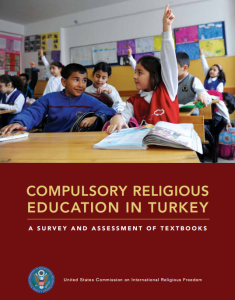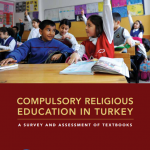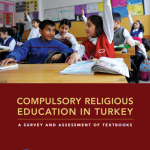ISTANBUL, Turkey (Morning Star News) – Newly revised textbooks for schoolchildren’s mandatory religion classes in Turkey are markedly improved but still have notable shortcomings, according to a study by the U.S. Commission on International Religious Freedom (USCIRF).
The textbooks do not adequately address Christianity and other non-Islamic religions, according to USCIRF.
“The current books are a clear improvement from previous ones,” according to the study. “There are no derogatory statements about non-Sunni Muslim religions, and substantial new sections on Alevi traditions are included. There are noteworthy passages on religion and science, religion and rationality, being a good citizen, religious freedom, and the origins of differences in Islamic thought.”
Despite the improvements to the texts, however, several problems remain, according to the study, “Compulsory Religious Education in Turkey, A Survey and Assessment of Textbooks,” released on Dec. 17. The textbooks’ “major weakness” is that they are written solely from an Islamic worldview, and consequently some information is misleading or biased.
“The textbooks are still written through the paradigm of the officially-sanctioned interpretations of Islam and Islamic culture,” the report stated. “All religious minority traditions in the country are depicted within the Muslim context rather than as distinct traditions. In addition, only superficial, limited, and misleading information is given about religions other than Islam, such as Judaism, Christianity, Hinduism and Buddhism.”
In Turkey, students from the fourth to the 12th grade are required to take “Religious Culture and Moral Knowledge” classes. Children of non-Muslims can opt out of the class if they identify their religion to school officials, a requirement that, according to USCIRF and other religious freedom groups, is a human rights violation.
In regard to Christianity, one example of misinformation is the depiction of the life of Jesus in the textbook for eighth-grade students, according to the study. Instead of explaining that Christians view Jesus as the only Son of God, He is depicted merely as one in a line of Islamic prophets called by God, it stated.
“When Jesus reached 30 years of age, Allah gave him the duty of being a prophet,” the textbook reads. “He then began inviting people to believe in Allah. At the start, only 12 people believed in his call. They are called the ‘disciples.’ The holy book of Christianity is the Incil [revelations that Muslims believe Allah gave to Jesus]. The four Incils written by and known with the names of their writers as Matthew, Mark, Luke and John are the most famous … Christians accept prophethood of other prophets besides Prophet Muhammad … Christians believe all human beings are born sinners, thus all children are washed with holy water to cleanse from their sins. This is called baptism.”
The author of the study, noted Turkish researcher Ziya Meral, wrote, “The view of Jesus as a prophet is not what Christians believe, but what Muslims believe. Similarly, the holy book of Christians is not only the Incil, but the Kutsal Kitap or Kitabı Mukaddes, the Holy Bible, with the Old and New Testaments as the two main parts. Students are not told where the four Gospels, which are part of the New Testament, fit into the Christian Bible. The expression, “the most famous” is also confusing, as they are the only ones in the canon of the New Testament; it most likely alludes to the idea that there were Gospels which prophesied Prophet Muhammad but were changed or destroyed by Christians.”
Similarly, Meral wrote, it is not clear what the text means in describing Christians as believing in other prophets besides Muhammad.
“Also, there is no unanimity in Christianity on the baptism of children, or its meaning regarding salvation from sins,” he added.
Meral noted that the texts tended to paint all Christian denominations with the same brush, glossing over different groups in Turkey such as the Armenians, Greeks, and the Syriac community.
“Particularly worrying” to the commission is the characterization of missionaries in Turkey in two textbooks, he wrote. The eighth-grade textbook makes inferences to Christian missionaries.
“The efforts of people from some faiths have turned into a struggle of completely establishing their own religion while insulting the values of the country they are in,” the text reads. “These people, who are almost propagating religions rather than promoting them, have turned to using and abusing financial and spiritual weaknesses of people. These behaviors are against religious tolerance and respect to beliefs. Individuals must be vigilant against such behaviors.”
The religious textbook for 12th-grade students specifically identifies Christian missionaries as a threat to Turkey and accuses them of, “taking advantage of social and economic weaknesses of people to be able to force them to change religion.”
“From time to time, we see methods of cheating and tricking used in missionary efforts, which is what is known as Christian expansionism,” the textbook reads. “With this abusive missionary method, people’s religious feelings, economic and social conditions are exploited to be able to force them to change their religion. With this side of it, abusive missionary activities is a harmful activity.”
The report said the entries were “disconcerting” and characterized them as “fear-mongering.”
“Such state-sanctioned hostility toward the activities of non-Muslim groups may have a direct relationship with high levels of xenophobia and social hostilities shown towards non-Muslims in Turkey,” the report went on to say.
Sahar Chaudhry, senior policy analyst at USCIRF, said in the case of Turkey and in many of the countries that USCIRF reports on, “It’s very common to hear governments or even communities talk about missionary groups. … Because they’re being seen as going past their belief and their right to practice and conveying their religion but also preying on the poor and deprived in communities. And this is where the perception is that these missionary groups are really just looking to boost their numbers. Our fear is that some of these passages will perpetuate misinformation or cause societal tensions that are unnecessary and unwarranted.”
Chaudry added that even in the light of the textbooks, religious freedom is greater in Turkey than it has been in the past.
“In the grand scope of religious freedom in Turkey, the situation for religious freedom in Turkey is better than any other time in the republic’s history,” Chaudry said. “So the textbooks should be put into a proper context. The religious freedom situation in Turkey after the collapse of the Ottoman Empire was dire for many of the religious minority communities because of very tight government restrictions. But since 2010, religious freedom has improved steadily in many ways.”
If you would like to help persecuted Christians, visit https://morningstarnews.org/resources/aid-agencies/ for a list of organizations that can orient you on how to get involved.
If you or your organization would like to help enable Morning Star News to continue raising awareness of persecuted Christians worldwide with original-content reporting, please consider collaborating at https://morningstarnews.org/donate/?
###
© 2015 Morning Star News. Articles/photos may be reprinted with credit to Morning Star News. https://morningstarnews.org
Morning Star News is a 501(c)(3) non-profit corporation that relies solely on contributions to offer original news reports of persecuted Christians. By providing reliable news on the suffering church, Morning Star News’ mission is to empower those in the free world to help and to encourage persecuted Christians that they are not forgotten or alone. For free subscription or to make tax-deductible donations, contact [email protected], or send check to Morning Star News, 34281 Doheny Park Rd., # 7022, Capistrano Beach, CA 92624, USA.
- USCIRF report on revised textbooks for religion classes. (USCIRF)




Speak Your Mind